International NGO-indsats for bæredygtig produktion og forbrug
BILAG D
International NGO-tænketank - resultater
1.1 Deltagerliste til mødet den 21.-22. november 2005
1) Mr. Claus Jørgensen, The Danish Consumer Council, Denmark.
Fiolstræde 17
Postbox 2188
1017 København K
Phone: +45 2250 0497
Fax: +45 7741 7722
Email: cj@fbr.dk
2) Mrs. Pia Olsen, Danish Society for Nature Conservation, Denmark.
Masnedøgade 20,
2100 Copenhagen Ø
Phone: +45 39174065
Fax: +45 39174141
Email: po@dn.dk
3) Mrs. Kristine Karpf, Danish Society for Nature Conservation, Denmark
Masnedøgade 20
2100 Copenhagen Ø
Phone: +45 39174067
Fax: +45 39174141
Email: krk@dn.dk
4) Mrs. Melissa Shinn, European Environmental Bureau (EEB), Bruxelles.
Phone: +32 2 289 13 00/ 003222891090
Email: melissa.shinn@eeb.org
5) Mrs. Eva Eiderström, Head of Section in the Swedish Society for Nature Conservation (SNF)
Box 4625, Åsögatan 115
SE-116 91 Stockholm
Sweden
Phone: +46 (0) 31 711 64 50
Fax: +46 (0) 31 711 64 30
Dir.line: +46 (0) 31 10 55 85
Mobile: +46 70 755 81 12
Email: Eva.Eiderstrom@snf.se
Website: www.snf.se
6) Mr. Janis Brizga, Head of the Board at Green Liberty, Latvia
Meza Street 4
Riga LV-1048
Latvia
Phone: +371 9118112
Fax: +371 7613806
Email: janis@zb-zeme.lv
Website: www.zb-zeme.lv
7) Mrs. Bozena Stasenkova, President at Association of Consumer Organizations in Slovakia
Ul.17.Novembra 14
064 01 Stará Lubovna
Slovakia
Phone/fax: +421-52- 4326047
Mobil : +421-903-032 696
Email: Asociaciask@stonline.sk
Website: www.spotrebiteliask.sk
8) Mr. Vahur Keerberg, Project Manager at SEI Talinn Centre (Estonian Institute for Sustainable Development, Stockholm Environmental Institute Talinn Centre)
Lai St. 34
10502 Tallinn,
Estonia
Phone: +372 6276115
Fax: +372 6276101 Estonia
Email: Vahur.Keerberg@seit.ee
Website: www.seit.ee
9) Mr. Lewis Akenji, International Relations Manager at Association of Conscious Consumers
H - 1027 Budapest
Bem Rakpart 30, II./19
Budapest 1027
Hungary
Phone: +36 305175187
Fax: +36 1 225 8136
Email: lewis@tve.hu/ lewis@mankon.org
Website: www.tudatosvasarlo.hu
10) Mr. Ondrej Valek, Chairman and advisor in Czech Coalition of ConsumersActivities, SCAP Initiative of the Czech Nat. Committee UNEP
Pod Zvahovem 56
152 00 Prague 5
Czech Republic
Phone: +420 604334424
Fax: +420251815870
Email: ondrej.velek@ecn.cz
Website: www.ekospotreba.unep.cz
11) Mr. Jan Rademaker, Executive Director at ANPED (The Northern Alliance for Sustainability)
PO box 59030
1040 KA Amsterdam
The Netherlands
Phone: +3120 475 1742
Fax: +3120 475 1743
Email: jan.rademaker@anped.org
Website: www.anped.org
12) Mrs. Pia Valota, arch./board member at the Associazione Consumatori Utenti (ACU)
Viale Andrea Doria 10
20124 Milano
Italy
Phone: +3902 67071132
Fax: +3902 6425293
Email: piavalota@libero.it
13) Mrs. Christina Drees, STEPS
Schwedter Stase 230
10435 Berlin
Germany
Phone: +49 17626112846
Email: drees@stepsgermany.org
Website: www.stepsgermany.org (from January 2006)
14) Mrs. Marie France Corre, UFC-Que Choisir
11-rue Guénot
F-75555 Paris, Cedex II
France
Phone: (33)144.931.935
Fax : (33)143.482.274
Email: mfcorre@quechoisir.org, mfrance.corre@wanadoo.fr
Webmail: www.quechoisir.org
15) Mr. Geert Waelkens, EU representative at Eurosif (European Social Investment Forum),
Rue Josef II 106
1000 Brussels
Belgium
Phone: +32 475509002
Fax: +32 15613783
Email: geert.waelkens@skynet.be
16) Mr. Raymond von Ermen, Executive Director at the European Partners for the Environment (EPE)
67 av. De la Toison d'Or
1060 Brussels
Belgium
Phone: 32 2 771 15 34
Fax: ++32 2 539 48 15
Email: raymond.vanermen@epe.be
1.2 Kommissorium
An international NGO think-tank on SCP
Following WSSD the Danish Society for the Conservation of Nature has in co-operation with the Danish Consumer Council set up a project on an international NGO think-tank, which will develop a proposal for an international programme on SCP.
The aim of the think-tank is to facilitate and develop a joint NGO input to supplement and contribute to the official UN process on SCP. It is also to ensure that SCP is kept it on the political agenda, e.g. at the EU and CSD level, and that NGOs play a proactive role in addressing the issue.
Set-up
The think-tank will be established during this spring and summer (2004) having 15 international representatives from environmental and consumer NGOs and researchers. In co-operation with EEB, BEUC, CI and IUCN the organisers are currently in the process of identifying and selecting representatives from around the world.
The project is financially supported by the Danish EPA, and runs for a 3 year period.
Process & output
The representatives will meet every half year over the 3 year period. In between the meetings background papers will be developed and internet dialogues facilitated to inform and prepare for the meetings. Case-studies are expected to focus the think-tanks dialogues and work in the identification of current gaps and root-cause problems, development of new political and economic instruments, and recommendations on how to use and combine instruments. The work will also be based on an inventory by the EU Commission on internal policies addressing SCP. Case-study identification has not begun yet, but chemicals, waste and natural resources could be possible areas.
The final output will be a publication gathering the think-tanks findings and recommendations, and a conference where the recommendations will be presented.
Challenges
Production and consumption must be addressed from an international perspective as patterns of production and consumption are trans-national. For the think-tank this aspect is one of the main challenges, but it is also a prerequisite when dealing with the transition to SCP on a global scale. An aspect, which the think-tank indicates is lacking in the official UN process, where the focus is more on the regional and national levels.
At the CSD 12 and 13 meeting SCP is a cross-cutting issue. In 2010-2011 SCP will be a concrete theme on the CSD agenda. There is a challenge in keeping the issue high on the international political agenda until then, and prepare an international contribution to the process from the NGO society.
Few NGOs have so far not been engaging and embracing SCP, as this has mainly been dealt with by governments and industry. There remains a challenge in mobilising a broader range of NGOs (not only consumer and environmental organisations) in the agenda.
NGOs have a direct contact to ordinary people i.e. consumers. There is a challenge in engaging the people in the international work on SCP through a broadening of the SCP discussion and challenges, and by contributing to a greater awareness on green and environmental products to create an understanding of how consumers through their daily product and service choices can have an impact.
1.3 Dagsorden
1.3.1.1 Monday the 21st
- 11-12: Introduction and welcome; practical details and work plans/work forms (different types of group work). Short presentation of all participants.
- 12-13: Outline of DN/DCC framework for the four meetings and the purpose of the think tank, followed by a discussion of this framework.
- 13-14: Lunch break.
- 14-16: Short presentation followed by group work to develop definitions of SCP and related parameters relevant in the work of the think tank.
- 16-17: Outdoor walk/break.
- 17.18:30: Brainstorm and discussion of focus sectors/products (like for example cars, washing powder, textiles, foods) which should lead to a selection of 3-5 different sectors/products for focus in the think tanks future work with SCP.
1.3.1.2 Tuesday the 22nd
- 9-10: Presentation on ‘state of the play’ by ‘someone’ from the Commission, including 15 minutes of questions/debate.
- 10-10:15: Coffee break
- 10:15-11: Finalizing/voting on the sectors suggested and discussed in the brainstorm Monday afternoon.
- 11-13: Group work in sector groups on GOALS for each sector, incorporated in the final output of the NGO think tank as a whole. These discussions should result in a written outline of potential goals from each sector group.
- 13-14: Lunch break.
- 14-15:30: Presentation of work in sector groups to the think tank (max 5 min each). Each presentation should be followed by feed back and discussion on the future work in each sector and it’s correlation with the other sectors.
- 15:30-15:45: Coffee break
- 15:45-16:30: Rounding of the meeting by summarizing the conclusions, deciding on a date for the next meeting etc.
1.4 Referat af mødet
1.4.1 MONDAY THE 21ST
1.4.1.1 Introduction and welcome
Pia Olsen from DN welcomed the participants of the NGO think tank and introduced the SCP framework and the overall think tank purpose of developing concrete recommendations and inputs to the ten year SCP framework. Then all participants gave a short presentation of themselves and their work. Finally Claus Jørgensen from DCC introduced himself and DCC’s role in the project.
1.4.1.2 Framework
Kristine Karpf from DN gave an outline of a possible framework for the future work in the think tank, involving a sector approach in which 4-5 sectors could be chosen and strategies of SCP could be developed for each one of these by specific sector working groups.
This presentation was followed by a discussion of whether the resources present in the think tank matched up to these goals and in this relation whether it was necessary to define the scope of the think tank to be purely environmental or if social issues could be included as well. Some felt it was necessary to map the previous initiatives and activities of SCP before continuing with any work in the think tank, while others pointed out that the goal of the think tank is not mapping and researching previous activities of SCP, but contributing with new and concrete ideas to the process. It was questioned whether a sector approach would guarantee a concrete and specific output and how the think tank could contribute with new ideas and not just repeat old inefficient conclusions. The discussion reflected a certain agreement in finding the holes and deficits of the SCP process, taking the differences of the SCP process in the European countries into account and to work towards moving the niche markets of SCP into the mainstream.
Pia Olsen concluded that the focus would remain on sectors, including both environmental and social issues and that the afternoon should therefore commence as planned with a discussion of SCP definitions.
1.4.1.3 Lunch
1.4.1.4 Discussion of definitions on SCP
On the basis of the paper sent out by DN before the meeting summarizing different definitions on SCP, discussions were conducted in groups on an appropriate definition. Four definitions came out of this group work:
a) Sustainable consumption is to care for the quality of life of the present and future generations providing goods and services in ways that are economically, socially and environmentally sustainable. Sustainable production means that goods and services are designed, manufactured and delivered, used and reused, in such a way that the needs for products and services of the present generation is met without depriving future generations of their ability to satisfy theirs. Main value: Freedom
b) SCP involves the basic needs of people, the continuous improvement of quality of life and well being of society, it deals with consumption and production of goods and services, efficient use of resources within the carrying capacity of earth and the socio-cultural, environmental and economic integrity of current and future generations. How to communicate the definition?
c) Not less/reduced production and consumption, but more efficient/better quality production and consumption. This influence business, government, civil society and consumers contributing to resource efficiency in the life cycle within the carrying capacity, social protection and to global equity for us and generations to come. Missing in all definitions is biodiversity.
d) To meet the needs of the present and future generations for goods and services in a way that is economically, socially and environmentally sustainable while addressing the issues of over and under consumption. Summary for SCP in handout. Changes in political and social structures.
These group discussions were followed by discussions of how the definitions evolved and what contextual experiences the participants have with these definitions. Some debate also continued on the goals of the think tank, the role of the Danish government in the project and knowledge and potential of the think tank.
It was concluded that DN would take the four definitions and come up with a single definition which would be the final SCP definition of the think tank.
1.4.1.5 Coffee break
1.4.1.6 Discussion on sectors
Suggestions for potential sectors to work on with:
- Textiles
- Toys
- Construction
- Mobile phones
- Food
- Household chemicals
- Consumer electronics
- Paper
- Weapons
- Cosmetics
- Services
- Leisure
- Energy
After some discussions and debate the following sectors were chosen for future work:
- Food
- Textiles
- Household chemicals
- Consumer electronics
1.4.2 TUESDAY THE 22ND
1.4.2.1 Presentation of SCP state-of-the-play
European Councillor Pernille Sørensen gave a presentation of the state-of-play on SCP. To give a short summary, Pernille started by introducing herself and went on to describe the initial initiatives on the SCP work programme that developed into the 10-year framework. Then she described the different activities of SCP on the EU level and the interrelated nature of these activities. On the international level the broader framework was outlined and main purpose and content of the 10-year framework on SCP was described. Finally a general brainstorm on SCP challenges was presented to inspire to future work within the think tank. The brainstorm was followed by a small discussion including examples of problems related to SCP on an EU level and the difficult, complex and challenging nature of SCP.
(Appendix 2: Slides from presentation)
1.4.2.2 Coffee break
1.4.2.3 Discussion on sectors
A small discussion was conducted on how to work in groups with the sector and it was finalized that each group should aim at developing goals for each sector to work with on the next two meetings, where instruments, stakeholders and implementation strategies should be developed related to these goals. Furthermore the groups should define rather specifically what groups of products was to be included in each sector.
1.4.2.4 Group work on sectors
The group work conclusions were as follows:
A) TEXTILES
Scope
Open, all textiles will be included in the work
Goals
First goal is sustainable textiles, which has not been further defined yet, but quality is a key concept.
Second goal is visibility. The group wants to examine the sector to find the holes or the ‘black areas’ and work with these.
Brainstorm
Need: Image, basic needs, protection, maintenance. Supply: Growth, wishes, other industry stakeholders. Considerations concerning developing new markets and parallel markets. Considerations concerning stakeholders. Reducing some elements. Subsidies on cotton in the US and EU. Initiatives towards consumers, rock stars, designers.
B) FOOD
Scope
Organic food, fair trade
Including the issues of transport, packaging, energy management, seasonality
Overall goal
To develop a system in which all issue based stakeholders have a voice that cover all aspects of the value chain under the aspect of sustainability in e.g. the form of labelling.
Think tank goal
Map out a process and steps to be taken by the different stakeholders to achieve overall goal.
Brainstorming “Steps to get there”
Identify which parts of the value chain are investigated by the different issue based stakeholders (fair trade, organic, biodiversity, air pollution, water, labour…) and which parts of the value chain are left out?
Focus on certain commodities?
Create synergies.
Initiate ideas for a food platform.
Use the final conference as a forum to bring together and inform the issue-based stakeholder groups.
(public procurement)
(niche to main stream market)
Issues in food that have not been addressed so far:
- International Trade regulations
- Labour laws
- Energy efficiency in food, life cycle, waste management
- Problem at level of producers
- Environmental issues related to food
- Integration of labelling (ICRT, Stiftung Warentest), connect fair trade with organic food sector
- Right to know, Food safety, GMO debate
Niche to mainstream
- share best practice on strategies from organic and fair trade movement to move from niche to mainstream market
- integration of labelling
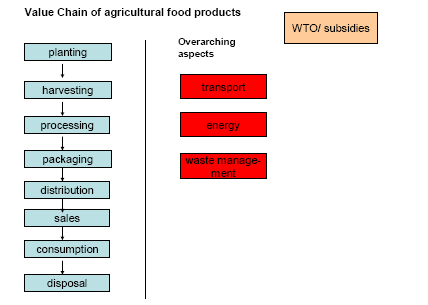
C) CONSUMER ELECTRONICS
Goals divided on target groups
Consumers
Short Term: 1) 10%/year increase of “green” (eco/energy labeled, “with EPD” etc.) products (4-5 years)
2) Making consumers to join WEEE management system (4-5 years)
Long Term: 1) over 50% of consumers are aware of the environmental/social impact of consumer electronics during the lifecycle of those (25-30 years)
Authorities
– ST: 1) Green Public Procurement implemented at EU/national/local level (4-5 years)
2) 50% of monetary value of public sector purchases are “green” (4-5 years)
– LT: 1) 75 % of monetary value of public sector purchases of “EU” of that moment are “green”
2) Consumption-endorsing commercials, targeted on kids, are banned throughout the “EU” of that moment
Producers/Retailers
– ST: 1) educate consumers on and direct suppliers towards sustainable alternatives
– LT: 1) higher awareness of industrial/retailers community about sustainable choices to be implemented and used during the product lifecycle
2) 50% of products/services on EU market are “green”
Service Providers
– ST: “products replacement with services” strategy and action plan in place on EU level
– LT: “products replacement with services” national campaigns carried out, 15% of households joined the scheme
– Examples of services: laundry, cleaning, telecommunication etc.
D) HOUSEHOLD CHEMICALS
Scope
Household cleaning products (for washing and cleaning)
Goals
- Minimize use of (unnecessary) chemicals: anti-bacteria's…
- Substitute harmful ingredients for the environment, including phosphorous, perfumes
- Phase out industrial double standards within the sector
- Increase independent information on these products and promote corporate code on conduct on consumer information (dosage, antibacterial products).
1.4.2.5 Lunch
1.4.2.6 Presentation of group work
The four sector working groups presented their work and each presentation was followed by a short discussion, where ideas and inputs were exchanged.
1.4.2.7 Coffee break
1.4.2.8 Conclusions and evaluation
The meeting was finished of with Claus Jørgensen from DCC summarizing the conclusions. It was decided that each sector group should before mid January make a short paper outlining the final sector goals, a work plan describing what the group hope to achieve within the next year of work (two more work meetings + exchanges in between meetings) and a list of possible needs for future work, like background papers and such, which DN hopes to be able to satisfy. Also participants are welcome to include sector experts in their work, although no more participants can be included in the think tank and attend the meetings. DN will establish a website where the groups can exchange ideas, news, comments and participants in general can communicate. Furthermore, the website should be open for reading only so that participants can refer to the website to interested contacts and related experts.
Some dates were suggested for the next meeting and it was agreed that DN and DCC should come up with two dates for suggestion in the next letter, that participants can then reply on. It was agreed that on the next meeting the think tank should discuss inputs and suggestions for the final conference in the autumn of 2006 and that each sector group should therefore start considering who they find relevant to invite to the conference.
A small discussion on exchanges of national SCP data resulted in Jan Rademaker proposing to send national overviews for the countries that ANPED has data on to DN, who can then put this on the website when it is established. Claus Jørgensen from DCC also promised to send out a comparison of the Nordic countries and their implementation of SCP (http://www.nordicpartnership.org/db
/files/methodology_and_data_report.pdf).
Finally an evaluation discussion was conducted, where DCC and DN asked participants for comments and critic on the meeting. Some of the critic included: that the think tank goals were too vague and broad to start with and that the fact that DCC and DN had outlined a framework did not invite for an open brainstorm on the goals and work in the think tank. Either it should have been totally open with no suggestions or fully structured with a finalized work plan already in place.
The agenda also received critic; some found it difficult to discuss goals for the think tank before deciding on the sector approach. Some found the discussion on SCP definitions irrelevant and believed it would have been more helpful if DCC and DN had just decided on a definition beforehand.
It was decided that an evaluation form would be send out along with the summary to improve the next two working meetings.
1.5 Præsentation
Framework for NGO think tank
by Kristine Krapf
1. Meeting: (goals)
- Finalizing definitions and parameters for SCP
- Finalizing sectors to work with in the think tank
- Finalizing main SCP goals for each sector
2. Meeting (instruments and stakeholders)
- Finalizing main instruments to reach SCP for each sector
- Dividing instruments on levels of action (local, national, regional, international)
- Developing a list of relevant stakeholders related to the instruments on each geographical level
3. Meeting (approaches and implementation)
- Deciding on relevant approaches
- Finalizing main implementation strategies and possibilities
- Incorporating these strategies into time schedules
4. Meeting
- CONFERENCE
1.6 Presentation
State of the play
by Pernille Sørensen
Dias 1
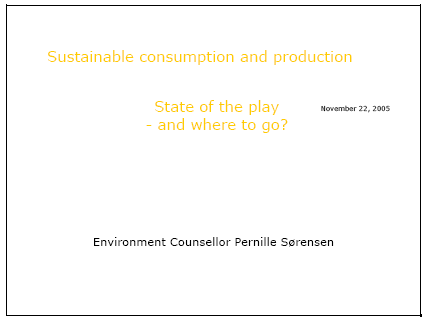
Dias 2
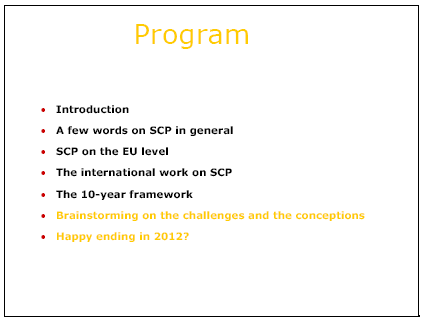
Dias 3
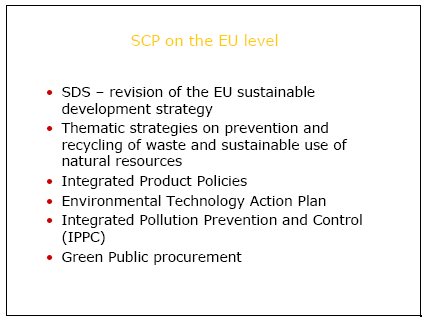
Dias 4

Dias 5
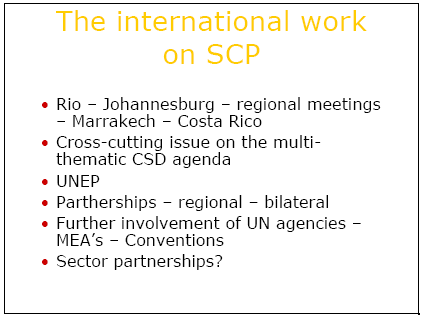
Dias 6
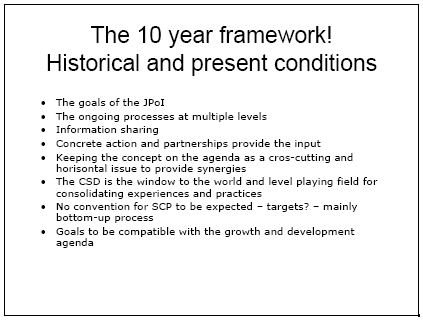
Dias 7
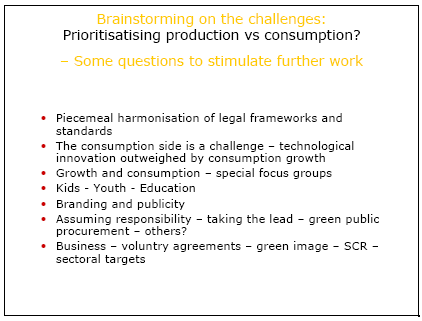
Dias 8
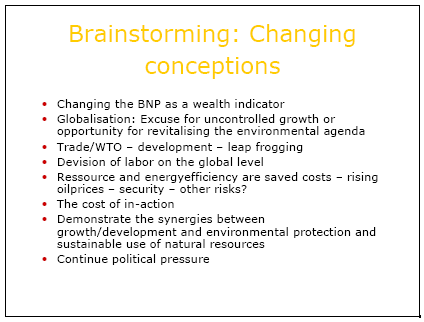
Dias 9
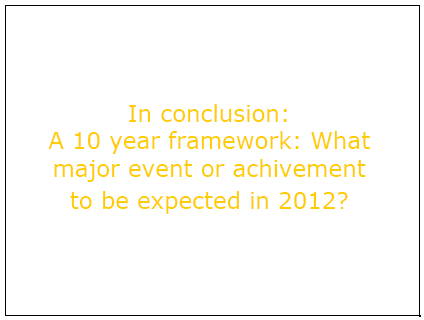
Version 1.0 Juli 2008, © Miljøstyrelsen.